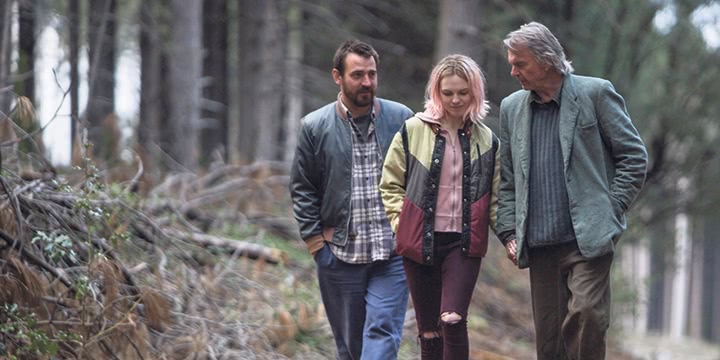Every artist – musician, director, performer, sculptor – is serious about their work.
How their respective art might be received by the public is largely out of their hands, but the intent behind each creation arrives after sincere and sometimes exhaustive effort. As such, it is no surprise that Simon Stone is passionate about his debut feature film, The Daughter, based on Henrik Ibsen’s The Wild Duck. What is somewhat surprising – and inspiring – is the depth of his passion for this story, in which no character (or audience) escapes unscathed.
“I suppose I’m hoping for the audience to walk away with the movie in their heads, lodged in their chest and their imagination, to pore over it in the subsequent days, and hoping that there’s a reflection of those who have gone through traumatic events or crises, of the mess and confusion and regret that they experience when those things happen. And also the very melancholy way you remember the delightful moments that led up to the tragic one. For those who haven’t experienced something like that, to maybe [gain] an insight into that experience,” says Stone.
The Daughter certainly has its share of delightful and despairing moments. It is by any reckoning a powerful film, aided by some grand performances from Paul Schneider, Ewen Leslie, Geoffrey Rush, Sam Neill, Miranda Otto, and notably Odessa Young in the titular role. It also has a particularly arresting finale, one that is likely to fulfil Stone’s wish for audiences to retain the film long after leaving the cinema. Pier Paolo Pasolini once spoke of scarring his audience, and although the story of The Daughter is at times troubling, Stone’s vision is not quite so severe.
“I wouldn’t say that of myself necessarily, because a scar is something you can’t get rid of and is often something you’re ashamed of, although it can be sexy,” he laughs. “But it involves a wound of some kind. I don’t want to wound or hurt my audience. I am interested in catharsis, I’m interested in moments of release. And sometimes that involves being led down a path of the consultation of the unpleasant realities in life. And the ultimate aim is a celebration of life, and the opportunity to recognise those unpleasant moments in life as they actually are, with honesty. I see a lot of films about awful events where there’s a kind of almost pornographic cynicism in the way that they’re made, where the filmmaker is clearly enjoying the idea that things are going terribly. I don’t enjoy it. It’s not pleasant for me to tell a story like this, but it’s necessary, and you are full of regret while you’re shooting because it isn’t nice.”
Though to be clear, the unpleasant aspects of The Daughter total a small percentage of the story. There are moments of great revelry and familiar humour – indeed, it is one of Stone’s strengths in adapting the script that we can quite easily insert ourselves into the lives of these companionable characters. This also forms part of the film’s premise, however – that while all may seem idyllic on the surface, there are hard personal truths always threatening to erupt. Perhaps the most conflicted and complex character – whose actions may, at first, appear quite ignoble – is Schneider’s Christian.
“I think he’s a wounded character, and a wounded animal lashes out pre-emptively to save themselves,” says Stone. “They can be incredibly dangerous because they feel so scared. I thank God that I’ve never been in the position where I’ve had the childhood of someone like Christian. I think all of us who have been saved that kind of trauma should appreciate we’re not him, and I think that there’s a fundamental level of respect that you have to have for someone who went through the events he did, who is still damaging his own life because he feels so damaged. That’s the paradox of his existence. He felt that the world gave up on him a long time ago, and he keeps being convinced that the world will be nice to him again, and he keeps destroying that hope through some kind of sense of inevitability that the world will keep screwing him over.”
It is perhaps the fact that we do find ourselves so enamoured by this tremendous cast (and eased into the world so vividly thanks to cinematographer Andrew Commis) that the unravelling of these lives moves us so deeply; that the selfish blend of lie and truth we are all capable of can have such repercussions.
“[Christian] is a weak, vulnerable person who needs someone to turn around and say, ‘If you want to be happy, you can be happy,’” says Stone. “I’m sure every single reader of this article has a friend who has had a deeply troubled childhood. The problem is, he’s dealing with a whole heap of other people who aren’t aware of how messed up he is, and they’re also not aware of how messed up they themselves are. How deeply insensitive they all are to the fact they’re living a lie. Nobody gets let off the hook. They’re all lovable, amazing human beings, but they’re all selfish. But we all are. So I wouldn’t turn to the person who has the most reasons for being the way he is and judge him worse than others.”
The Daughter (dir. Simon Stone) is in cinemas Thursday March 17.
































